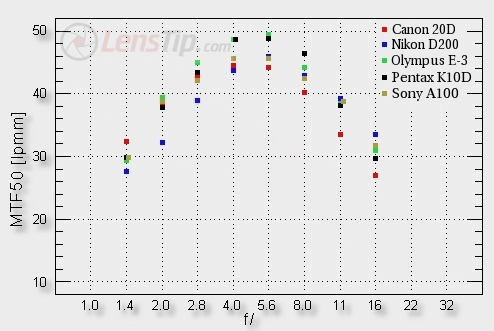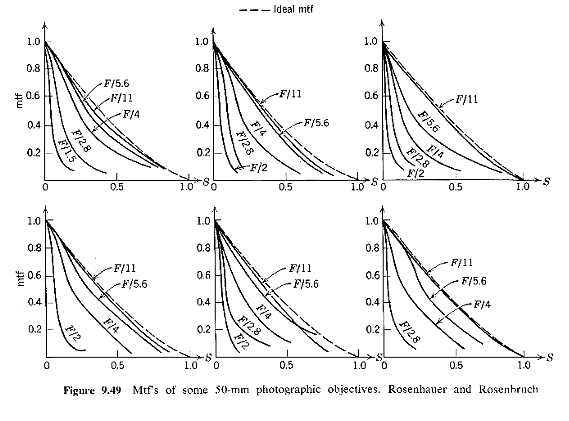Hi Folks!
What's on my mind boils down to this- If it's true that larger aperture telescopes reveal more detail in distant objects, isn't it the same with cameras and f/stop?
For example, a larger telescope gathers more light, sure. That enables one to use a high magnification (thus spreading out the light) on the formed image. But doesn't the telescope aperture itself offer increased resolution due to its diameter, speaking of light physics? Put another way, does the light exiting a 5mm diameter (pupil- sized) light pipe pointed a something contain all the same detail as that gathered by a 50mm telescope, only dimmer?
Relative to cameras, would be the resolution offered by f/2 compared to f11 on a certain lens, besides diffraction effects...
Results 1 to 9 of 9
Thread: Aperture vs resolution
-
3rd August 2021, 09:57 PM #1New Member

- Join Date
- Aug 2021
- Location
- California
- Posts
- 2
Aperture vs resolution
-
4th August 2021, 03:03 AM #2
Re: Aperture vs resolution
Not quite that simple; camera lenses tend to be a lot more complex that amateur telescopes, I'm thinking of reflecting, rather than refracting designs.
Larger aperture devices let in more light. With camera lenses, that generally means that wider apertures result in reduced resolution, especially at the edges of the lens. Lens resolution is generally measured in lines /mm. Resolution is shown using MTF (Modulation Transfer Function) charts.
Here is a quick link that tells you how to read an MFT chart: https://imaging.nikon.com/lineup/lens/mtf_chart.htm
Let's look at the MFT chart of a fast f/0.95 58mm lens. This lens sells for around $US 8000.

Now let's look at the MFT chart of a modern f1.8 50mm lens that sells for about $US 200

The much less expensive but slower 50mm lens is sharper that the faster and much more expensive lens.
As a general rule, maximum lens resolution tends to be 2 stops down from maximum aperture. As you have noted, diffraction effects will start influencing resolution, once one stops down too far.
As a general rule, slower (smaller maximum aperture lenses) and longer focal length lenses have higher resolution. Look at the MTF chart for an f5.6 800mm lens. This is a $US 16000 lens. This lens is super sharp.

-
4th August 2021, 03:20 AM #3

- Join Date
- Feb 2012
- Location
- Texas
- Posts
- 6,956
- Real Name
- Ted
Re: Aperture vs resolution
Welcome. Sorry, but no.
I'm not into telescopes. Someone else might address that question.For example, a larger telescope gathers more light, sure. That enables one to use a high magnification (thus spreading out the light) on the formed image. But doesn't the telescope aperture itself offer increased resolution due to its diameter, speaking of light physics?
"Dimmer" is a measure of luminance (candelas per unit area) so the light exiting a 5mm diameter light pipe pointed at something would be just as bright as that from a 50mm light pipe pointed at the same thing (ignoring diffraction).Put another way, does the light exiting a 5mm diameter (pupil- sized) light pipe pointed a something contain all the same detail as that gathered by a 50mm telescope, only dimmer?
Here's a chart that tells the tale for resolution versus aperture:Relative to cameras, [what] would be the resolution offered by f/2 compared to f11 on a certain lens, besides diffraction effects? ...

In answer to your question, f/2 is about the same as f/11 but that does not tell the whole story. In particular, f/1.4 is worse than f/2 and f/5.6 is significantly better than either one.
https://www.lenstip.com/190.4-Lens_r...esolution.html
I chose this lens' chart because I owned one a long time ago and it really was soft wide-open ... but the shape of the curve is typical for all normal camera lenses.
HTH.Last edited by xpatUSA; 4th August 2021 at 03:54 AM.
-
4th August 2021, 05:12 AM #4New Member

- Join Date
- Aug 2021
- Location
- California
- Posts
- 2
Re: Aperture vs resolution
Thank you gentlemen.
I have found a better way to describe my question. Angular resolution - for a telescope is dependent on the objective diameter and wavelength of light of interest. https://sciencing.com/telescope-size...wer-17717.html
Given that, when photographing a distant object with a telephoto lens, wouldn't I want to use it as wide open as possible? Except apparently our imperfect lenses as you both have pointed out, are naturally sharper at 2 stops? But any more stops than that would seem to unnecessarily limit the angular resolution.
?
thanks again
-
4th August 2021, 10:25 AM #5
Re: Aperture vs resolution
If I have a 'distant object' to photograph with 'a' (singular and specific) telephoto lens, and the photograph was as important as your question implies, then I would run tests with that particular lens, preferably in a similar lighting scenario to the 'distant object'.
If tests were impossible or impractical, then I would make multiple exposures and bracket on Aperture: not just full stops, but one third stops, if possible.
Theory is fantastic: Applying any Generalized Theory (specifically to the lens you have) is a little less fantastic, yet extremely useful as it puts one in a really good starting position, for real world Photography Outcomes.
WW
-
4th August 2021, 03:07 PM #6
Re: Aperture vs resolution
I don't use telescopes, but I think there is a basic confusion here. The link doesn't talk about apertures; it talks about the diameter of objective lenses. It states that a larger objective produces less diffraction. By analogy, when you narrow the aperture, increase diffraction and, at a certain point, reach the level of "diffraction limited resolution", at which point diffraction becomes visible. This is is a function of photosite size as well as aperture diameter.
So by analogy, if you open the aperture on a camera, you decrease diffraction, but it makes no discernable difference once you have opened it past the size at which resolution is diffraction limited. However, the cost is that as you widen the aperture, you will gradually introduce optical problems that have nothing to do with diffraction. That's why most lenses should not be shot wide open.Last edited by DanK; 4th August 2021 at 03:36 PM.
-
4th August 2021, 03:33 PM #7

- Join Date
- Feb 2012
- Location
- Texas
- Posts
- 6,956
- Real Name
- Ted
Re: Aperture vs resolution
Correct -if you are referring only to the Rayleigh limit of resolution where sin(alpha) equals wavelength over diameter. But I personally would not want to do that, because of wide-open lens aberrations.
Quite so -but not "naturally" sharper (I do not regard lens aberrations as being natural), and not exactly two stops either because lenses do vary:Except apparently our imperfect lenses as you both have pointed out, are naturally sharper at 2 stops?

http://www.bobatkins.com/photography.../mtf/mtf2.html
The use of "unnecessarily" needs to be addressed. For example, some photographers like to shoot waterfalls with temporal smoothing of the water. Others might want to motion-blur the moon for artistic reasons or get star trails with a long exposure. Such photos require a longer exposure time which, in the absence of an ND filter, necessarily requires a smaller aperture with consequently visible diffraction.But any more stops than that would seem to unnecessarily limit the angular resolution?
Anybody?Last edited by xpatUSA; 6th August 2021 at 05:07 PM. Reason: added "anybody?"
-
7th August 2021, 02:15 AM #8
Re: Aperture vs resolution
I can't resist the 'anybody' call.
Firstly, if you (Scarecrow) are desirous of Theory which is published in easy to understand plain-speak, then Dr Atkins' (Bob Atkins) many papers will bring you fun reading and provide a wealth of accurate and practically usable theory.
On the use of 'unnecessary' - yep I agree with what I believe is Ted's basic message: that is to say if we are talking Theory then we must stick to Theory, only. The word 'unnecessary' (and 'necessary') are for purview of the Practical and Applied Worlds of Photography.
As a simple and general rule for Practical Photography I advocate that the CHOICE of the Aperture one uses, would be heavily weighted to the realization of the Artist's Statement and/or Purpose or Use of the Image.
We can (and probably should) rely on Theory. Each of us might rely more or less and that reliance factor probably will vary. For example if I were copying Art Works for the Client's Insurance Purposes (a task which I have done), I rely heavily on Theory that I know. On the other hand, if I were at an International Sports Meet, and I had the opportunity to snap a World Record, (a task which I have also done), whilst I would have prepared myself into a position based on the Theory I know: at the moment of image capture and the split second before, the ONLY element in my mind would be TIMING.
So - returning to your 'distant object' and your telephoto lens ... and per Ted's example of temporal soothing waters: even if one were using an ND Filter to allow for a 'necessary' Shutter Speed, one might also choose a small Aperture to accommodate a 'necessary' DoF and/or a the 'necessary' ISO to match the 'necessary' Shutter Speed.
I expect the bottom line is, before you release the Shutter, once you have established the Camera Viewpoint (i.e. the place exactly where you plonk the Camera, which determines the Perspective of the Shot and sans studio lighting also decides the Lighting on the Subject) and then you decide on the Focal Length of the Lens to use (which decides the Angle of View of the Shot), then you have only three choice to make: Aperture; Shutter Speed; and ISO.
I'd advocate using Theory to assist the choices of Av, Tv and ISO, but not to dictate those choices.
WW
-
7th August 2021, 03:22 AM #9

- Join Date
- Feb 2012
- Location
- Texas
- Posts
- 6,956
- Real Name
- Ted
Re: Aperture vs resolution
Sadly, Bill, I'm beginning to wonder if responses that are clearly contrary to some rhetorical questions may met by a Great Silence.

 Helpful Posts:
Helpful Posts: 
 Reply With Quote
Reply With Quote

